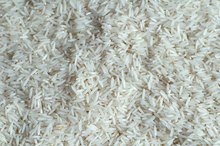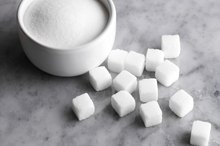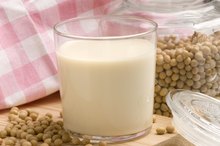Side Effects of Protein-Only Diet
Your body needs protein for the growth, maintenance and repair of body tissues and muscles. High-protein diets have become increasing popular the last few decades as an effective weight-loss method. However, eating a diet that contains only protein puts you at risk for missing essential vitamins and minerals found in other foods. Eating a healthy, well-balanced diet helps you avoid the adverse side effects of a protein-only diet.
Constipation
Eating a protein-only diet puts you at risk for digestive upsets, including constipation. Carbohydrates provide dietary fiber for the body, aiding in the softening of stools and elimination of waste products. Most high protein foods, such as meat and eggs, have no dietary fiber, and eating a diet of protein only eliminates carbs from the diet. High-protein foods also take longer to digest in the body, which slows the transit time of waste moving through the digestive system and prevents smooth bowel movements.
- Eating a protein-only diet puts you at risk for digestive upsets, including constipation.
- High-protein foods also take longer to digest in the body, which slows the transit time of waste moving through the digestive system and prevents smooth bowel movements.
Lethargy
When Does the Body Start to Use Muscle Tissue for Energy?
Learn More
A diet that contains only protein has no energy-producing carbs to fuel your body and brain. Carbs provide glucose, your body's primary fuel for movement, digestion and thinking. A protein-only diet eliminates this primary source of energy causing you to feel fatigued and lethargic. Eventually, the body will start to use protein as a source of fuel to replace the carbs, which takes it away from its own functions in the body. Inadequate stores of protein needed to build and repair muscles can cause the breakdown and wasting of muscle tissue and lead to increased fatigue.
- A diet that contains only protein has no energy-producing carbs to fuel your body and brain.
Decreased Calcium Stores
Eating too much protein might lead to decreased calcium in the bones long-term. Your body releases acids during protein digestion, which in effect increases blood acidity. To neutralize acidity in the blood, your body removes calcium from your bones to absorb the released acids. This reduces the amount of calcium in the bones and, without adequate dietary replenishment, loss of calcium leads to decreased bone mineral density, according to the United States Department of Agricultural Research Service. However, based on a review of recent research evaluating protein's effect on bone health published in the February 2010 issue of "Current Opinion in Lipidology," the authors to determined dietary protein could not increase pH levels -- blood acidity -- high enough to decrease bone mineral density. The effect of high protein intake on bone health remains a controversial issue.
- Eating too much protein might lead to decreased calcium in the bones long-term.
- This reduces the amount of calcium in the bones and, without adequate dietary replenishment, loss of calcium leads to decreased bone mineral density, according to the United States Department of Agricultural Research Service.
Lack of Essential Nutrients
Isometric Diet
Learn More
Eating a protein-only diet eliminates essential nutrients in the body, including complex carbs, healthy fats, vitamins and minerals. Carbs in the form of vegetables, fruits and whole grains provide your body's primary fuel source along with essential nutrients such as the B vitamins and magnesium, which increase energy and aid in muscle contraction. Healthy fats, such as nuts, fatty fish and olive oil help your body to perform necessary functions, such as maintaining hormonal balance, keeping skin healthy and absorbing vitamins. Fruits and vegetables provide a myriad of vitamins and minerals that help protect your heart and might prevent certain cancers, heart disease and stroke. Thus, a protein-only diet might put the body at risk of malnutrition and increase disease risk.
- Eating a protein-only diet eliminates essential nutrients in the body, including complex carbs, healthy fats, vitamins and minerals.
- Healthy fats, such as nuts, fatty fish and olive oil help your body to perform necessary functions, such as maintaining hormonal balance, keeping skin healthy and absorbing vitamins.
Related Articles
References
- Harvard School of Public Health: Protein
- University of Southern California News: Meat and Cheese May Be as Bad as Smoking
- United States Department of Agricultural Research Service: Boning Up on Osteoporosis
- Current Opinion in Lipidology: Dietary Protein and Skeletal Health: A Review of Recent Human Research
- American Journal of Clinical Nutrition: Dietary Protein, Calcium Metabolism, and Skeletal Homeostasis Revisited
- American Journal of Epidemiology: Protein Consumption and Bone Fractures in Women
- Witard, O. C., Jackman, S. R., Breen, L., Smith, K., Selby, A., & Tipton, K. D. (2014). Myofibrillar muscle protein synthesis rates subsequent to a meal in response to increasing doses of whey protein at rest and after resistance exercise. The American Journal of Clinical Nutrition, 99(1), 86-95.
- Kim, I. Y., Schutzler, S., Schrader, A., Spencer, H. J., Azhar, G., Ferrando, A. A., & Wolfe, R. R. (2015). The anabolic response to a meal containing different amounts of protein is not limited by the maximal stimulation of protein synthesis in healthy young adults. American Journal of Physiology-Endocrinology and Metabolism, ajpendo-00365.
- Dawson-Hughes, B., Harris, S. S., Rasmussen, H., Song, L., & Dallal, G. E. (2004). Effect of dietary protein supplements on calcium excretion in healthy older men and women. The Journal of Clinical Endocrinology & Metabolism, 89(3), 1169-1173.
- Kerstetter, J. E., Kenny, A. M., & Insogna, K. L. (2011). Dietary protein and skeletal health: a review of recent human research. Current Opinion in Lipidology, 22(1), 16-20.
- Bonjour, J. P. (2005). Dietary protein: an essential nutrient for bone health.Journal of the American College of Nutrition, 24 (sup6), 526S-536S.
- Munger, R. G., Cerhan, J. R., & Chiu, B. C. (1999). Prospective study of dietary protein intake and risk of hip fracture in postmenopausal women. The American Journal of Clinical Nutrition, 69(1), 147-152.
- Rizzoli, R., & Bonjour, J. P. (2004). Dietary protein and bone health. Journal of Bone and Mineral Research, 19(4), 527-531.
- Seale JL, Conway JM. Relationship between overnight energy expenditure and BMR measured in a room-sized calorimeter. European Journal of Clinical Nutrition. 1999 Feb;53(2):107-11.
- Zhang, K., Sun, M., Werner, P., Kovera, A. J., Albu, J., Pi-Sunyer, F. X., & Boozer, C. N. (2002). Sleeping metabolic rate in relation to body mass index and body composition. International Journal of Obesity and Related Metabolic Disorders: Journal of the International Association for the Study of Obesity, 26(3), 376-383.
- Mischler, I., Vermorel, M., Montaurier, C., Mounier, R., Pialoux, V., Péquignot, J. M., ... & Fellmann, N. (2003). Prolonged daytime exercise repeated over 4 days increases sleeping heart rate and metabolic rate. Canadian Journal of Applied Physiology, 28(4), 616-629.
- Sofer, S., Eliraz, A., Kaplan, S., Voet, H., Fink, G., Kima, T., & Madar, Z. (2011). Greater weight loss and hormonal changes after 6 months diet with carbohydrates eaten mostly at dinner. Obesity, 19(10), 2006-2014.
- Andersen, C. J., Blesso, C. N., Lee, J., Barona, J., Shah, D., Thomas, M. J., & Fernandez, M. L. (2013). Egg consumption modulates HDL lipid composition and increases the cholesterol-accepting capacity of serum in metabolic syndrome. Lipids, 48(6), 557-567.
- McManus, K., Antinoro, L., & Sacks, F. (2001). A randomized controlled trial of a moderate-fat, low-energy diet compared with a low fat, low-energy diet for weight loss in overweight adults. International Journal of Obesity and Related Metabolic Disorders: Journal of the International Association for the Study of Obesity, 25(10), 1503-1511.
- Shai, I., Schwarzfuchs, D., Henkin, Y., Shahar, D. R., Witkow, S., Greenberg, I., ... & Stampfer, M. J. (2008). Weight loss with a low-carbohydrate, Mediterranean, or low-fat diet. New England Journal of Medicine, 359(3), 229-241.
Writer Bio
Jennifer Andrews specializes in writing about health, wellness and nutrition. Andrews has a Master of Science in physical therapy from the University of Alberta as well as a bachelor's degree in kinesiology. She teaches yoga and pilates and is a recent graduate of the Institute of Integrative Nutrition.









